© 2011 Ray Wong
Former UK Prime Minister Margaret Thatcher was a controversial public figure. And in many ways, The Iron Lady may be a controversial film as we wonder how truthful it is with regard to Thatcher's private and public lives.
Margaret Thatcher (Meryl Streep), in her twilight years, reflects on her life as one of Britain's most famous women and a borderline senile private citizen. Thatcher often hallucinates about her late husband Denis (Jim Broadbent), who passed away years ago. Her daughter Carol (Olivia Colman) tries to take care of her, but Thatcher refuses. It seems that not only does she live as if her husband's still alive, but she's stuck in the past.
As an ambitious young woman (Alexandra Roach), Margaret Roberts' passion is in politics, even though it's traditionally a men's arena. This ambition and a singleminded drive eventually gets her into the parliament and one of the most active members of the conservative party. Denis Thatcher (Harry Lloyd) marries her despite her strong personality and ambition.
Eventually, Thatcher decides to run for Prime Minister even though she doesn't think she can win. Her advisors think otherwise. She changes her public image and succeeds in winning, thus starting her long, tumulus run as the PM. Meanwhile, her career is putting strain in her relationship with her family.
Meryl Streep (It's Complicated) can't seem to do wrong (well, except for a few stinkers here and there throughout her stellar career). Once again, she plays one of the world's most recognizable women, and this time, it's a total triumph. Not only does she physically resemble the Iron Lady, but she's succeeded in channeling Thatcher in spirit as well. She successfully portrays the strong outer-self of Thatcher, the inner vulnerability, and her love and devotion, despite her neglect, to her family.
Jim Broadbent (Harry Potter and the Deathly Hallows) is also fantastic as Denis Thatcher, her devoted husband who loves her even as she neglects him and their children. He is the rock, and Broadbent's performance and chemistry with Streep are the heart of the story. Olivia Colman (Hot Fuzz) is touching as Thatcher's daughter Carol. Alexandra Roach (Private Peaceful) plays young Margaret with vim and sensibility, while Harry Lloyd (Jane Eyre) is somewhat goofy as young Denis but matches the playful personality of Broadbent's portrayal.
Written by Abi Morgan (Brick Lane), the screenplay has a traditional structure that weaves the frame story (with old Thatcher) with episodic flashbacks of her life. In fact, the same structure is used in J. Edgar. While there's no way to compress Thatcher's life and achievements (and falls) in such a short time, Morgan is able to pick out some key events to emphasize Thatcher's personality, and professional as well as personal conflicts. Unfortunately, the episodic approach does strip away some of their impact, leaving us with a feeling of surface-scratching. It would have been more effective with the frame story is kept to the minimum while we explore her younger life more fully.
Meanwhile, the frame story of older Thatcher doesn't have much of a plot, and it feels somewhat repetitive as she hallucinates about her husband and then reminisce about her past. That said, the relationship between Thatcher and her husband is so strong that it allows great emotions, which lead to a poignant moment at the end when Thatcher must learn to let go.
Director Phyllida Lloyd (Macbeth) knows where the heart of the story and lingers, perhaps a bit too long, on that part. Yet she is able to weave the arc with flashbacks in an effective way, revealing Thatcher's career and ambition against her personal life and vulnerabilities. The production is handsome. The costumes are fine, and the makeup -- especially that of Streep -- is excellent.
The Iron Lady is a solid but flawed biopic. It has heart and real emotions, but somewhat disjointed in the storytelling and too heavy on the present instead of the past. It almost feels like a love story in disguise. Biopics are difficult to do well, and this movie is no exception. Still, it has enough emotions to melt even the iron hearts; it's not a bad thing.
Stars: Meryl Streep, Jim Broadbent, Olivia Colman, Alexandra Roach, Harry Lloyd
Director: Phyllida Lloyd
Writer: Abi Morgan
Distributor: Weinstein Co.
MPAA Rating: PG-13 for some violent images and brief nudity
Running Time: 105 minutes
Ratings:
Script - 7
Performance - 9
Direction - 7
Cinematography - 8
Music/Sound - 7
Editing - 8
Production - 8
Total - 7.5 out of 10.0
The Girl with the Dragon Tattoo
© 2011 Ray Wong

Based on the bestselling series by Swedish novelist Stieg Larsson, The Girl with the Dragon Tattoo is also an English-language remake of the popular Swedish movies.
 Mikael Blomkvist (Daniel Craig) is a journalist who has recently been disgraced in a libel case in which his unreliable source ruins his credibility, causes him his job, and wipes out his bank account. While down in the dumps, he's recruited by Henrik Vanger (Christopher Plummer), the patriarch of a rich, famous family-owned company, to write his memoir. In reality, Vanger wants Mikael to investigate a 40-year-old murder mystery: his beloved niece, Harriet, disappeared in 1966, and Henrik believes she was murdered by one of his family members.
Mikael Blomkvist (Daniel Craig) is a journalist who has recently been disgraced in a libel case in which his unreliable source ruins his credibility, causes him his job, and wipes out his bank account. While down in the dumps, he's recruited by Henrik Vanger (Christopher Plummer), the patriarch of a rich, famous family-owned company, to write his memoir. In reality, Vanger wants Mikael to investigate a 40-year-old murder mystery: his beloved niece, Harriet, disappeared in 1966, and Henrik believes she was murdered by one of his family members.
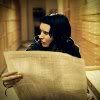 While Mikael interviews the family and investigates the evidences collected throughout the years, he discovers bits and pieces of the family's dark secrets. For example, their ties to the Nazi party, or how some members such as Anita Vanger (Joely Richardson) have not been in touch with the family for decades. The head of the company, Martin Vanger (Stellan Skarsgard) indulges his uncle Henrik but he doesn't believe Mikael will find anything, for they have trie to solve Harriet's murder for over forty years.
While Mikael interviews the family and investigates the evidences collected throughout the years, he discovers bits and pieces of the family's dark secrets. For example, their ties to the Nazi party, or how some members such as Anita Vanger (Joely Richardson) have not been in touch with the family for decades. The head of the company, Martin Vanger (Stellan Skarsgard) indulges his uncle Henrik but he doesn't believe Mikael will find anything, for they have trie to solve Harriet's murder for over forty years.
 Mikael decides to hire Lisabeth (Rooney Mara) to be his assistant because of her unparalleled skills in discovering details and knack for hacking computers. However, Lisabeth is an antisocial outcast who has had a hard life. They have to build mutual trust if they want to work together to solve the mystery, when their involvement increasingly puts them in danger.
Mikael decides to hire Lisabeth (Rooney Mara) to be his assistant because of her unparalleled skills in discovering details and knack for hacking computers. However, Lisabeth is an antisocial outcast who has had a hard life. They have to build mutual trust if they want to work together to solve the mystery, when their involvement increasingly puts them in danger.
 Daniel Craig (Cowboys and Aliens) sheds his tough guy image to play a bookish, sensitive journalist in this adaptation. His performance is understated and impressive, conveying resourcefulness and courage as well as vulnerability and confusion. Rooney Mara (The Social Network) totally reinvents herself in the title role. Her fearless performance is transformational and outstanding. A rising star to watch.
Daniel Craig (Cowboys and Aliens) sheds his tough guy image to play a bookish, sensitive journalist in this adaptation. His performance is understated and impressive, conveying resourcefulness and courage as well as vulnerability and confusion. Rooney Mara (The Social Network) totally reinvents herself in the title role. Her fearless performance is transformational and outstanding. A rising star to watch.
 The large supporting cast includes the incomparable Christopher Plummer (Beginners), who plays the gentle patriarch of the Vanger family with grace and style. Stellan Skarsgard (Thor) is also excellent as Martin Vanger. Joely Richardson (Anonymous) is appropriately gaunt and sullen as Henrik's estranged niece Anita. Robin Wright (Moneyball) is at ease playing Mikael's editor and lover.
The large supporting cast includes the incomparable Christopher Plummer (Beginners), who plays the gentle patriarch of the Vanger family with grace and style. Stellan Skarsgard (Thor) is also excellent as Martin Vanger. Joely Richardson (Anonymous) is appropriately gaunt and sullen as Henrik's estranged niece Anita. Robin Wright (Moneyball) is at ease playing Mikael's editor and lover.
 Adapted from Larsson's novel by Steven Zaillian (Moneyball), the screenplay is split between two parallel narratives that eventually merge: Mikael's arc and Lisabeth's ordeal. While the structure and the amount of information and number of characters can be confusing at first, Zaillian is successful in keeping everything straight and streamlined, and the two narratives advance smoothly with a great pace. There's always conflict, and the plot moves along with good tension -- there's hardly a dull and boring moment. Part of the fun for the audience is to put the clues together with Mikael. But the screenplay also succeeds in giving us strong characters and their backgrounds that may have nothing to do with the plot but make the story more resonant.
Adapted from Larsson's novel by Steven Zaillian (Moneyball), the screenplay is split between two parallel narratives that eventually merge: Mikael's arc and Lisabeth's ordeal. While the structure and the amount of information and number of characters can be confusing at first, Zaillian is successful in keeping everything straight and streamlined, and the two narratives advance smoothly with a great pace. There's always conflict, and the plot moves along with good tension -- there's hardly a dull and boring moment. Part of the fun for the audience is to put the clues together with Mikael. But the screenplay also succeeds in giving us strong characters and their backgrounds that may have nothing to do with the plot but make the story more resonant.
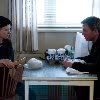 Director Fincher (The Social Network) is no stranger to thrillers that deal with killers or violent crimes. This movie is up his alley, and he gives us a taut mystery and drama that doesn't shy away from harsh materials such as rape and torture. In fact, some scenes are so brutal that it can be difficult to watch, but I applaud him, the filmmakers and the actors for being true to the story and characters. The film also has a strong European look and feel, appropriately, even though it's an American production.
Director Fincher (The Social Network) is no stranger to thrillers that deal with killers or violent crimes. This movie is up his alley, and he gives us a taut mystery and drama that doesn't shy away from harsh materials such as rape and torture. In fact, some scenes are so brutal that it can be difficult to watch, but I applaud him, the filmmakers and the actors for being true to the story and characters. The film also has a strong European look and feel, appropriately, even though it's an American production.
 Not having seen the Swedish original or read the novel, I'm impressed with the storytelling and performances. It's one of the best thrillers in recent years.
Not having seen the Swedish original or read the novel, I'm impressed with the storytelling and performances. It's one of the best thrillers in recent years.
Stars: Daniel Craig, Rooney Mara, Christopher Plummer, Stellan Skarsgard, Robin Wright, Joely Richardson, Goran Visnjic
Director: David Fincher
Writers: Steven Zaillian (based on novel by Stieg Larsson)
Distributor: Sonys
MPAA Rating: R for brutal violence including rape and torture, strong sexuality, graphic nudity and language
Running Time: 158 minutes
Ratings:
Script - 8
Performance - 8
Direction - 8
Cinematography - 8
Music/Sound - 7
Editing - 8
Production - 9
Total - 8.1 out of 10.0

Based on the bestselling series by Swedish novelist Stieg Larsson, The Girl with the Dragon Tattoo is also an English-language remake of the popular Swedish movies.
 Mikael Blomkvist (Daniel Craig) is a journalist who has recently been disgraced in a libel case in which his unreliable source ruins his credibility, causes him his job, and wipes out his bank account. While down in the dumps, he's recruited by Henrik Vanger (Christopher Plummer), the patriarch of a rich, famous family-owned company, to write his memoir. In reality, Vanger wants Mikael to investigate a 40-year-old murder mystery: his beloved niece, Harriet, disappeared in 1966, and Henrik believes she was murdered by one of his family members.
Mikael Blomkvist (Daniel Craig) is a journalist who has recently been disgraced in a libel case in which his unreliable source ruins his credibility, causes him his job, and wipes out his bank account. While down in the dumps, he's recruited by Henrik Vanger (Christopher Plummer), the patriarch of a rich, famous family-owned company, to write his memoir. In reality, Vanger wants Mikael to investigate a 40-year-old murder mystery: his beloved niece, Harriet, disappeared in 1966, and Henrik believes she was murdered by one of his family members. While Mikael interviews the family and investigates the evidences collected throughout the years, he discovers bits and pieces of the family's dark secrets. For example, their ties to the Nazi party, or how some members such as Anita Vanger (Joely Richardson) have not been in touch with the family for decades. The head of the company, Martin Vanger (Stellan Skarsgard) indulges his uncle Henrik but he doesn't believe Mikael will find anything, for they have trie to solve Harriet's murder for over forty years.
While Mikael interviews the family and investigates the evidences collected throughout the years, he discovers bits and pieces of the family's dark secrets. For example, their ties to the Nazi party, or how some members such as Anita Vanger (Joely Richardson) have not been in touch with the family for decades. The head of the company, Martin Vanger (Stellan Skarsgard) indulges his uncle Henrik but he doesn't believe Mikael will find anything, for they have trie to solve Harriet's murder for over forty years. Mikael decides to hire Lisabeth (Rooney Mara) to be his assistant because of her unparalleled skills in discovering details and knack for hacking computers. However, Lisabeth is an antisocial outcast who has had a hard life. They have to build mutual trust if they want to work together to solve the mystery, when their involvement increasingly puts them in danger.
Mikael decides to hire Lisabeth (Rooney Mara) to be his assistant because of her unparalleled skills in discovering details and knack for hacking computers. However, Lisabeth is an antisocial outcast who has had a hard life. They have to build mutual trust if they want to work together to solve the mystery, when their involvement increasingly puts them in danger. Daniel Craig (Cowboys and Aliens) sheds his tough guy image to play a bookish, sensitive journalist in this adaptation. His performance is understated and impressive, conveying resourcefulness and courage as well as vulnerability and confusion. Rooney Mara (The Social Network) totally reinvents herself in the title role. Her fearless performance is transformational and outstanding. A rising star to watch.
Daniel Craig (Cowboys and Aliens) sheds his tough guy image to play a bookish, sensitive journalist in this adaptation. His performance is understated and impressive, conveying resourcefulness and courage as well as vulnerability and confusion. Rooney Mara (The Social Network) totally reinvents herself in the title role. Her fearless performance is transformational and outstanding. A rising star to watch. The large supporting cast includes the incomparable Christopher Plummer (Beginners), who plays the gentle patriarch of the Vanger family with grace and style. Stellan Skarsgard (Thor) is also excellent as Martin Vanger. Joely Richardson (Anonymous) is appropriately gaunt and sullen as Henrik's estranged niece Anita. Robin Wright (Moneyball) is at ease playing Mikael's editor and lover.
The large supporting cast includes the incomparable Christopher Plummer (Beginners), who plays the gentle patriarch of the Vanger family with grace and style. Stellan Skarsgard (Thor) is also excellent as Martin Vanger. Joely Richardson (Anonymous) is appropriately gaunt and sullen as Henrik's estranged niece Anita. Robin Wright (Moneyball) is at ease playing Mikael's editor and lover. Adapted from Larsson's novel by Steven Zaillian (Moneyball), the screenplay is split between two parallel narratives that eventually merge: Mikael's arc and Lisabeth's ordeal. While the structure and the amount of information and number of characters can be confusing at first, Zaillian is successful in keeping everything straight and streamlined, and the two narratives advance smoothly with a great pace. There's always conflict, and the plot moves along with good tension -- there's hardly a dull and boring moment. Part of the fun for the audience is to put the clues together with Mikael. But the screenplay also succeeds in giving us strong characters and their backgrounds that may have nothing to do with the plot but make the story more resonant.
Adapted from Larsson's novel by Steven Zaillian (Moneyball), the screenplay is split between two parallel narratives that eventually merge: Mikael's arc and Lisabeth's ordeal. While the structure and the amount of information and number of characters can be confusing at first, Zaillian is successful in keeping everything straight and streamlined, and the two narratives advance smoothly with a great pace. There's always conflict, and the plot moves along with good tension -- there's hardly a dull and boring moment. Part of the fun for the audience is to put the clues together with Mikael. But the screenplay also succeeds in giving us strong characters and their backgrounds that may have nothing to do with the plot but make the story more resonant. Director Fincher (The Social Network) is no stranger to thrillers that deal with killers or violent crimes. This movie is up his alley, and he gives us a taut mystery and drama that doesn't shy away from harsh materials such as rape and torture. In fact, some scenes are so brutal that it can be difficult to watch, but I applaud him, the filmmakers and the actors for being true to the story and characters. The film also has a strong European look and feel, appropriately, even though it's an American production.
Director Fincher (The Social Network) is no stranger to thrillers that deal with killers or violent crimes. This movie is up his alley, and he gives us a taut mystery and drama that doesn't shy away from harsh materials such as rape and torture. In fact, some scenes are so brutal that it can be difficult to watch, but I applaud him, the filmmakers and the actors for being true to the story and characters. The film also has a strong European look and feel, appropriately, even though it's an American production. Not having seen the Swedish original or read the novel, I'm impressed with the storytelling and performances. It's one of the best thrillers in recent years.
Not having seen the Swedish original or read the novel, I'm impressed with the storytelling and performances. It's one of the best thrillers in recent years.Stars: Daniel Craig, Rooney Mara, Christopher Plummer, Stellan Skarsgard, Robin Wright, Joely Richardson, Goran Visnjic
Director: David Fincher
Writers: Steven Zaillian (based on novel by Stieg Larsson)
Distributor: Sonys
MPAA Rating: R for brutal violence including rape and torture, strong sexuality, graphic nudity and language
Running Time: 158 minutes
Ratings:
Script - 8
Performance - 8
Direction - 8
Cinematography - 8
Music/Sound - 7
Editing - 8
Production - 9
Total - 8.1 out of 10.0
Shame
© 2011 Ray Wong

Let's get this out of the way first: yes, Shame earned its NC-17 rating fair and square, what with its explicit nudity and sexual content. But is there something more substantial than soft core porn?
 Brandon (Michael Fassbender) is a handsome, charming and successful advertising executive at a prestigious New York firm. On the surface, he has everything: a fledging career, a boss (James Badge Dale) who adores him, a posh river-view bachelor pad, and a busy sex life. But underneath all that, there's a lonely man with a dark secret: Brandon is a sex addict. He's also emotionally closed up. He couldn't maintain any real connection with anyone.
Brandon (Michael Fassbender) is a handsome, charming and successful advertising executive at a prestigious New York firm. On the surface, he has everything: a fledging career, a boss (James Badge Dale) who adores him, a posh river-view bachelor pad, and a busy sex life. But underneath all that, there's a lonely man with a dark secret: Brandon is a sex addict. He's also emotionally closed up. He couldn't maintain any real connection with anyone.
 He's coping just fine, thank you very much, until his free-spirited sister Sissy (Carey Mulligan) shows up to crash at his place. She is a lounge singer who has just broken up with her boyfriend and needs a place to stay. Reluctantly Brandon lets her. But soon, she is ruining his routines and life -- not to mention his privacy and desperation to keep his secret hidden.
He's coping just fine, thank you very much, until his free-spirited sister Sissy (Carey Mulligan) shows up to crash at his place. She is a lounge singer who has just broken up with her boyfriend and needs a place to stay. Reluctantly Brandon lets her. But soon, she is ruining his routines and life -- not to mention his privacy and desperation to keep his secret hidden.
 Michael Fassbender (A Dangerous Method) has garnered much attention lately with his starring roles in movies such as X-Men: First Class and Jane Eyre. But his role as the sex addict in Shame is propelling him, rather quickly, into the stratosphere of stardom. As Brandon, Fassbender not only bares his body for the camera, he also bares his soul. His performance of the outwardly normal but internally deviant and tortured man is sublime, to say the least. It was no surprise that he took the Best Actor award at the Venice Film Festival and is now one of the frontrunners at the Oscars.
Michael Fassbender (A Dangerous Method) has garnered much attention lately with his starring roles in movies such as X-Men: First Class and Jane Eyre. But his role as the sex addict in Shame is propelling him, rather quickly, into the stratosphere of stardom. As Brandon, Fassbender not only bares his body for the camera, he also bares his soul. His performance of the outwardly normal but internally deviant and tortured man is sublime, to say the least. It was no surprise that he took the Best Actor award at the Venice Film Festival and is now one of the frontrunners at the Oscars.
 Carey Mulligan (Drive) also broke mold by playing an attention-seeking, out-of-control manipulator who just wants to be loved, instead of her usual innocent, naive young women. Her screen times are relatively brief but her role is pivotal and important, and she makes it her own. The supporting cast is all excellent including James Badge Dale (The Conspirator) as Brandon's jerk of a boss and Nicole Beharie (The Express) as the casualty of Brandon's romantic redemption.
Carey Mulligan (Drive) also broke mold by playing an attention-seeking, out-of-control manipulator who just wants to be loved, instead of her usual innocent, naive young women. Her screen times are relatively brief but her role is pivotal and important, and she makes it her own. The supporting cast is all excellent including James Badge Dale (The Conspirator) as Brandon's jerk of a boss and Nicole Beharie (The Express) as the casualty of Brandon's romantic redemption.
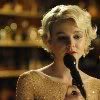 Written by Abi Morgan (The Iron Lady) and director Steve McQueen (Hunger), the screenplay is surprisingly bare-bone. There's practically no plot, and I am not entirely sure what the character arc is. I would categorize this as an extreme character study. Sure, things are happening and connections are forged and broken, and characters are forced into situations and find themselves cornered. Yet as a story, it is relatively plotless. The situations are there for the characters, especially the protagonist, to reveal themselves behind their facades and pretense. Morgan and McQueen don't spend too much time explaining the characters' backgrounds and motivations. We're supposed to get to know them throughout the story.
Written by Abi Morgan (The Iron Lady) and director Steve McQueen (Hunger), the screenplay is surprisingly bare-bone. There's practically no plot, and I am not entirely sure what the character arc is. I would categorize this as an extreme character study. Sure, things are happening and connections are forged and broken, and characters are forced into situations and find themselves cornered. Yet as a story, it is relatively plotless. The situations are there for the characters, especially the protagonist, to reveal themselves behind their facades and pretense. Morgan and McQueen don't spend too much time explaining the characters' backgrounds and motivations. We're supposed to get to know them throughout the story.
 Unfortunately, as amazing as the actors are, the characters simply aren't very likable or sympathetic. We may understand their turmoils and conflicts, but we don't necessarily identify or empathize with them. "Get some help. Seriously" is my initial thought. As a character study or cautionary tale, the story explores certain dark and deep themes: addiction, emotional unavailability, family, relationships… However, I feel that they have gone to the extremes and, in turn, alienated the audiences. Therefore, it fails to fully engage me.
Unfortunately, as amazing as the actors are, the characters simply aren't very likable or sympathetic. We may understand their turmoils and conflicts, but we don't necessarily identify or empathize with them. "Get some help. Seriously" is my initial thought. As a character study or cautionary tale, the story explores certain dark and deep themes: addiction, emotional unavailability, family, relationships… However, I feel that they have gone to the extremes and, in turn, alienated the audiences. Therefore, it fails to fully engage me.
 McQueen's directing style is minimalistic, often with long tracking shot of characters staring at nothing. However, I do appreciate his artistic vision and use of camera movements, colors, patterns, and themes. He's good at setting the mood and letting the actors do their thing. Michael Fassbender certainly has made it work for him. While it's a story of a sex addict, the nudity and sex scenes could feel gratuitous at times. That's definitely an artistic choice, though.
McQueen's directing style is minimalistic, often with long tracking shot of characters staring at nothing. However, I do appreciate his artistic vision and use of camera movements, colors, patterns, and themes. He's good at setting the mood and letting the actors do their thing. Michael Fassbender certainly has made it work for him. While it's a story of a sex addict, the nudity and sex scenes could feel gratuitous at times. That's definitely an artistic choice, though.
 Shame is a solemn character study with superb performances from its leads, and an artistically interesting "art film." It's just a shame that the characters are not so likable and the story lacks a certain quality to fully engage us.
Shame is a solemn character study with superb performances from its leads, and an artistically interesting "art film." It's just a shame that the characters are not so likable and the story lacks a certain quality to fully engage us.
Stars: Michael Fassbender, Carey Mulligan, James Badge Dale, Nicole Beharie
Director: Steve McQueen
Writers: Abi Morgan, Steve McQueen
Distributor: Fox Searchlight
MPAA Rating: NC-17 for explicit sexual content
Running Time: 101 minutes
Ratings:
Script - 6
Performance - 8
Direction - 7
Cinematography - 7
Music/Sound - 7
Editing - 7
Production - 7
Total - 7.0 out of 10.0

Let's get this out of the way first: yes, Shame earned its NC-17 rating fair and square, what with its explicit nudity and sexual content. But is there something more substantial than soft core porn?
 Brandon (Michael Fassbender) is a handsome, charming and successful advertising executive at a prestigious New York firm. On the surface, he has everything: a fledging career, a boss (James Badge Dale) who adores him, a posh river-view bachelor pad, and a busy sex life. But underneath all that, there's a lonely man with a dark secret: Brandon is a sex addict. He's also emotionally closed up. He couldn't maintain any real connection with anyone.
Brandon (Michael Fassbender) is a handsome, charming and successful advertising executive at a prestigious New York firm. On the surface, he has everything: a fledging career, a boss (James Badge Dale) who adores him, a posh river-view bachelor pad, and a busy sex life. But underneath all that, there's a lonely man with a dark secret: Brandon is a sex addict. He's also emotionally closed up. He couldn't maintain any real connection with anyone. He's coping just fine, thank you very much, until his free-spirited sister Sissy (Carey Mulligan) shows up to crash at his place. She is a lounge singer who has just broken up with her boyfriend and needs a place to stay. Reluctantly Brandon lets her. But soon, she is ruining his routines and life -- not to mention his privacy and desperation to keep his secret hidden.
He's coping just fine, thank you very much, until his free-spirited sister Sissy (Carey Mulligan) shows up to crash at his place. She is a lounge singer who has just broken up with her boyfriend and needs a place to stay. Reluctantly Brandon lets her. But soon, she is ruining his routines and life -- not to mention his privacy and desperation to keep his secret hidden. Michael Fassbender (A Dangerous Method) has garnered much attention lately with his starring roles in movies such as X-Men: First Class and Jane Eyre. But his role as the sex addict in Shame is propelling him, rather quickly, into the stratosphere of stardom. As Brandon, Fassbender not only bares his body for the camera, he also bares his soul. His performance of the outwardly normal but internally deviant and tortured man is sublime, to say the least. It was no surprise that he took the Best Actor award at the Venice Film Festival and is now one of the frontrunners at the Oscars.
Michael Fassbender (A Dangerous Method) has garnered much attention lately with his starring roles in movies such as X-Men: First Class and Jane Eyre. But his role as the sex addict in Shame is propelling him, rather quickly, into the stratosphere of stardom. As Brandon, Fassbender not only bares his body for the camera, he also bares his soul. His performance of the outwardly normal but internally deviant and tortured man is sublime, to say the least. It was no surprise that he took the Best Actor award at the Venice Film Festival and is now one of the frontrunners at the Oscars. Carey Mulligan (Drive) also broke mold by playing an attention-seeking, out-of-control manipulator who just wants to be loved, instead of her usual innocent, naive young women. Her screen times are relatively brief but her role is pivotal and important, and she makes it her own. The supporting cast is all excellent including James Badge Dale (The Conspirator) as Brandon's jerk of a boss and Nicole Beharie (The Express) as the casualty of Brandon's romantic redemption.
Carey Mulligan (Drive) also broke mold by playing an attention-seeking, out-of-control manipulator who just wants to be loved, instead of her usual innocent, naive young women. Her screen times are relatively brief but her role is pivotal and important, and she makes it her own. The supporting cast is all excellent including James Badge Dale (The Conspirator) as Brandon's jerk of a boss and Nicole Beharie (The Express) as the casualty of Brandon's romantic redemption. Written by Abi Morgan (The Iron Lady) and director Steve McQueen (Hunger), the screenplay is surprisingly bare-bone. There's practically no plot, and I am not entirely sure what the character arc is. I would categorize this as an extreme character study. Sure, things are happening and connections are forged and broken, and characters are forced into situations and find themselves cornered. Yet as a story, it is relatively plotless. The situations are there for the characters, especially the protagonist, to reveal themselves behind their facades and pretense. Morgan and McQueen don't spend too much time explaining the characters' backgrounds and motivations. We're supposed to get to know them throughout the story.
Written by Abi Morgan (The Iron Lady) and director Steve McQueen (Hunger), the screenplay is surprisingly bare-bone. There's practically no plot, and I am not entirely sure what the character arc is. I would categorize this as an extreme character study. Sure, things are happening and connections are forged and broken, and characters are forced into situations and find themselves cornered. Yet as a story, it is relatively plotless. The situations are there for the characters, especially the protagonist, to reveal themselves behind their facades and pretense. Morgan and McQueen don't spend too much time explaining the characters' backgrounds and motivations. We're supposed to get to know them throughout the story. Unfortunately, as amazing as the actors are, the characters simply aren't very likable or sympathetic. We may understand their turmoils and conflicts, but we don't necessarily identify or empathize with them. "Get some help. Seriously" is my initial thought. As a character study or cautionary tale, the story explores certain dark and deep themes: addiction, emotional unavailability, family, relationships… However, I feel that they have gone to the extremes and, in turn, alienated the audiences. Therefore, it fails to fully engage me.
Unfortunately, as amazing as the actors are, the characters simply aren't very likable or sympathetic. We may understand their turmoils and conflicts, but we don't necessarily identify or empathize with them. "Get some help. Seriously" is my initial thought. As a character study or cautionary tale, the story explores certain dark and deep themes: addiction, emotional unavailability, family, relationships… However, I feel that they have gone to the extremes and, in turn, alienated the audiences. Therefore, it fails to fully engage me. McQueen's directing style is minimalistic, often with long tracking shot of characters staring at nothing. However, I do appreciate his artistic vision and use of camera movements, colors, patterns, and themes. He's good at setting the mood and letting the actors do their thing. Michael Fassbender certainly has made it work for him. While it's a story of a sex addict, the nudity and sex scenes could feel gratuitous at times. That's definitely an artistic choice, though.
McQueen's directing style is minimalistic, often with long tracking shot of characters staring at nothing. However, I do appreciate his artistic vision and use of camera movements, colors, patterns, and themes. He's good at setting the mood and letting the actors do their thing. Michael Fassbender certainly has made it work for him. While it's a story of a sex addict, the nudity and sex scenes could feel gratuitous at times. That's definitely an artistic choice, though. Shame is a solemn character study with superb performances from its leads, and an artistically interesting "art film." It's just a shame that the characters are not so likable and the story lacks a certain quality to fully engage us.
Shame is a solemn character study with superb performances from its leads, and an artistically interesting "art film." It's just a shame that the characters are not so likable and the story lacks a certain quality to fully engage us.Stars: Michael Fassbender, Carey Mulligan, James Badge Dale, Nicole Beharie
Director: Steve McQueen
Writers: Abi Morgan, Steve McQueen
Distributor: Fox Searchlight
MPAA Rating: NC-17 for explicit sexual content
Running Time: 101 minutes
Ratings:
Script - 6
Performance - 8
Direction - 7
Cinematography - 7
Music/Sound - 7
Editing - 7
Production - 7
Total - 7.0 out of 10.0
The Artist
© 2011 Ray Wong
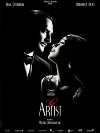
What a strange concept: a silent movie about silent movies made in 2011. And you know what? The Artist is a beautiful concept that is beautifully executed.
George Valentin (Jean Dujardin) is the most famous movie star in the 1920s. He has everything: looks, charisma, a bigger-than-life career, a big house and a beautiful wife. Peppy (Berenice Bejo) is an aspiring actress who has a crush on Valentin. When they meet at the studio, romantic sparks fly except Valentin is a big star and he's married. They eventually go their separate ways.
 Throughout the next few years, Peppy's star begins to rise, while silent films are replaced by talkies. Valentin refuses to bow to the "new gimmick" and the studio wants new faces. Valentin decides to spend all his money producing his new silent movie, but the studio is right. No one wants to see silent films anymore.
Throughout the next few years, Peppy's star begins to rise, while silent films are replaced by talkies. Valentin refuses to bow to the "new gimmick" and the studio wants new faces. Valentin decides to spend all his money producing his new silent movie, but the studio is right. No one wants to see silent films anymore.
 When the Great Depression hits, Valentin loses everything, including his wife. He struggles to make ends meet while Peppy becomes one of the biggest stars in Hollywood.Their paths meet again, but despite their feelings for each other, Valentin is too proud to admit his failure and let Peppy take care of him and his career.
When the Great Depression hits, Valentin loses everything, including his wife. He struggles to make ends meet while Peppy becomes one of the biggest stars in Hollywood.Their paths meet again, but despite their feelings for each other, Valentin is too proud to admit his failure and let Peppy take care of him and his career.
French actor Jean Dujardin (Little White Lies) was hardly known in the US, until now. The Artist showcases Dujardin's handsome and expressive face, agile physicality, and great charisma. All without a single line of dialogue. It's quite a feat and Dujardin has done an impressive job playing both the larger-than-life silent film star and the introspective, private man.
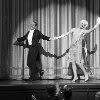 Argentinian actress Berenice Bejo (Prey) is just as charming as Peppy. Her effervescence helps lift the movie and steal some spotlight from Dujardin. They have great chemistry together, which seems more impressive given they never "said" a word to each other -- or at least we never heard them speak.
Argentinian actress Berenice Bejo (Prey) is just as charming as Peppy. Her effervescence helps lift the movie and steal some spotlight from Dujardin. They have great chemistry together, which seems more impressive given they never "said" a word to each other -- or at least we never heard them speak.
 American actors fill the supporting roles. John Goodman (Red State) plays the studio executive/director with a gleeful menace. James Cromwell (Secretariat) is earnest as Valentin's loyal chauffeur. Penelope Ann Miller (Flipped) is fittingly cold as Valentin's wife, and Missi Pyle (Taking Chances) has a small but flashy role as Valentin's costar.
American actors fill the supporting roles. John Goodman (Red State) plays the studio executive/director with a gleeful menace. James Cromwell (Secretariat) is earnest as Valentin's loyal chauffeur. Penelope Ann Miller (Flipped) is fittingly cold as Valentin's wife, and Missi Pyle (Taking Chances) has a small but flashy role as Valentin's costar.
Written and directed by Michel Hazanavicius (Mes amis), who is also Bejo's husband, the screenplay is both a melodrama and a delightful tribute to Hollywood's past. Hazanavicius captures the magic and mood of the 1920s and early 30s, as well as the Hollywood studio system. The plot is, to be honest, rather simple and predictable and melodramatic. And suitably so. By adopting such a plot, Hazanavicius succeeds in giving us something that fits perfectly the spirit of his chosen media: silent film. I mean, how else are you going to tell a story with only minimal dialogue? Movie loves will notice his tribute to silent films and old Hollywood, all done in great humor.
 Hazanavicius's direction is light and breezy, with plenty of physical comedy and also melodrama. The production is handsome enough. But the most impressive part of the movie is the music. Given that's more or less the only thing we hear throughout the movie, the music evokes the feel of a silent film perfectly. Composer Ludovic Bource has done a fantastic job.
Hazanavicius's direction is light and breezy, with plenty of physical comedy and also melodrama. The production is handsome enough. But the most impressive part of the movie is the music. Given that's more or less the only thing we hear throughout the movie, the music evokes the feel of a silent film perfectly. Composer Ludovic Bource has done a fantastic job.
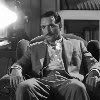 The Artist, on surface, seems silly and cliched. But once you buy into the conceit, the result is a delightful and playful tribute to Hollywood. It's also heartwarming and uplifting. Everything an artist would be proud of.
The Artist, on surface, seems silly and cliched. But once you buy into the conceit, the result is a delightful and playful tribute to Hollywood. It's also heartwarming and uplifting. Everything an artist would be proud of.
Stars: Jean Dujardin, Berenice Bejo, John Goodman, James Cromwell, Penelope Ann Miller, Missi Pyle
Director: Michel Hazanavicius
Writer: Michel Hazanavicius
Distributor: Weinstein Company
MPAA Rating: PG-13 for disturbing image and crude gesture
Running Time: 100 minutes
Ratings:
Script - 7
Performance - 8
Direction - 8
Cinematography - 8
Music/Sound - 9
Editing - 7
Production - 8
Total - 8.0 out of 10.0

What a strange concept: a silent movie about silent movies made in 2011. And you know what? The Artist is a beautiful concept that is beautifully executed.
George Valentin (Jean Dujardin) is the most famous movie star in the 1920s. He has everything: looks, charisma, a bigger-than-life career, a big house and a beautiful wife. Peppy (Berenice Bejo) is an aspiring actress who has a crush on Valentin. When they meet at the studio, romantic sparks fly except Valentin is a big star and he's married. They eventually go their separate ways.
 Throughout the next few years, Peppy's star begins to rise, while silent films are replaced by talkies. Valentin refuses to bow to the "new gimmick" and the studio wants new faces. Valentin decides to spend all his money producing his new silent movie, but the studio is right. No one wants to see silent films anymore.
Throughout the next few years, Peppy's star begins to rise, while silent films are replaced by talkies. Valentin refuses to bow to the "new gimmick" and the studio wants new faces. Valentin decides to spend all his money producing his new silent movie, but the studio is right. No one wants to see silent films anymore. When the Great Depression hits, Valentin loses everything, including his wife. He struggles to make ends meet while Peppy becomes one of the biggest stars in Hollywood.Their paths meet again, but despite their feelings for each other, Valentin is too proud to admit his failure and let Peppy take care of him and his career.
When the Great Depression hits, Valentin loses everything, including his wife. He struggles to make ends meet while Peppy becomes one of the biggest stars in Hollywood.Their paths meet again, but despite their feelings for each other, Valentin is too proud to admit his failure and let Peppy take care of him and his career.French actor Jean Dujardin (Little White Lies) was hardly known in the US, until now. The Artist showcases Dujardin's handsome and expressive face, agile physicality, and great charisma. All without a single line of dialogue. It's quite a feat and Dujardin has done an impressive job playing both the larger-than-life silent film star and the introspective, private man.
 Argentinian actress Berenice Bejo (Prey) is just as charming as Peppy. Her effervescence helps lift the movie and steal some spotlight from Dujardin. They have great chemistry together, which seems more impressive given they never "said" a word to each other -- or at least we never heard them speak.
Argentinian actress Berenice Bejo (Prey) is just as charming as Peppy. Her effervescence helps lift the movie and steal some spotlight from Dujardin. They have great chemistry together, which seems more impressive given they never "said" a word to each other -- or at least we never heard them speak. American actors fill the supporting roles. John Goodman (Red State) plays the studio executive/director with a gleeful menace. James Cromwell (Secretariat) is earnest as Valentin's loyal chauffeur. Penelope Ann Miller (Flipped) is fittingly cold as Valentin's wife, and Missi Pyle (Taking Chances) has a small but flashy role as Valentin's costar.
American actors fill the supporting roles. John Goodman (Red State) plays the studio executive/director with a gleeful menace. James Cromwell (Secretariat) is earnest as Valentin's loyal chauffeur. Penelope Ann Miller (Flipped) is fittingly cold as Valentin's wife, and Missi Pyle (Taking Chances) has a small but flashy role as Valentin's costar.Written and directed by Michel Hazanavicius (Mes amis), who is also Bejo's husband, the screenplay is both a melodrama and a delightful tribute to Hollywood's past. Hazanavicius captures the magic and mood of the 1920s and early 30s, as well as the Hollywood studio system. The plot is, to be honest, rather simple and predictable and melodramatic. And suitably so. By adopting such a plot, Hazanavicius succeeds in giving us something that fits perfectly the spirit of his chosen media: silent film. I mean, how else are you going to tell a story with only minimal dialogue? Movie loves will notice his tribute to silent films and old Hollywood, all done in great humor.
 Hazanavicius's direction is light and breezy, with plenty of physical comedy and also melodrama. The production is handsome enough. But the most impressive part of the movie is the music. Given that's more or less the only thing we hear throughout the movie, the music evokes the feel of a silent film perfectly. Composer Ludovic Bource has done a fantastic job.
Hazanavicius's direction is light and breezy, with plenty of physical comedy and also melodrama. The production is handsome enough. But the most impressive part of the movie is the music. Given that's more or less the only thing we hear throughout the movie, the music evokes the feel of a silent film perfectly. Composer Ludovic Bource has done a fantastic job. The Artist, on surface, seems silly and cliched. But once you buy into the conceit, the result is a delightful and playful tribute to Hollywood. It's also heartwarming and uplifting. Everything an artist would be proud of.
The Artist, on surface, seems silly and cliched. But once you buy into the conceit, the result is a delightful and playful tribute to Hollywood. It's also heartwarming and uplifting. Everything an artist would be proud of.Stars: Jean Dujardin, Berenice Bejo, John Goodman, James Cromwell, Penelope Ann Miller, Missi Pyle
Director: Michel Hazanavicius
Writer: Michel Hazanavicius
Distributor: Weinstein Company
MPAA Rating: PG-13 for disturbing image and crude gesture
Running Time: 100 minutes
Ratings:
Script - 7
Performance - 8
Direction - 8
Cinematography - 8
Music/Sound - 9
Editing - 7
Production - 8
Total - 8.0 out of 10.0
My Week with Marilyn
© 2011 Ray Wong

Anything about Marilyn Monroe is bound to be fascinating since she was such a fascinating creature. But behind her fascinating public persona, there is no secret that she was a mess. My Week with Marilyn offers a candid behind-the-scene look at one of the brightest stars in history.
 Colin Clark (Eddie Redmayne) is an ambitious young man (with British pedigree) determined to make it into the film business. Through personal network and perseverance, he begins his career working for Sir Laurence Olivier's production as a third assistant director. Lucky for him, his first movie was The Prince and the Showgirl starring Olivier (Kenneth Branagh) and Marilyn Monroe (Michelle Williams).
Colin Clark (Eddie Redmayne) is an ambitious young man (with British pedigree) determined to make it into the film business. Through personal network and perseverance, he begins his career working for Sir Laurence Olivier's production as a third assistant director. Lucky for him, his first movie was The Prince and the Showgirl starring Olivier (Kenneth Branagh) and Marilyn Monroe (Michelle Williams).
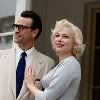 Colin starts to pursue a wardrobe girl, Lucy (Emma Watson) while trying to fit in at the production where everyone treats him like a naive kid. But when Marilyn shows up, Colin's world changes. At first, everyone is in awe with her, of course. But as they realize what a mess she is -- she's always late; she's insecure; she is emotionally unstable; she acts like a frightened child -- and the production is being delayed, their patience, especially Olivier's, is wearing thin.
Colin starts to pursue a wardrobe girl, Lucy (Emma Watson) while trying to fit in at the production where everyone treats him like a naive kid. But when Marilyn shows up, Colin's world changes. At first, everyone is in awe with her, of course. But as they realize what a mess she is -- she's always late; she's insecure; she is emotionally unstable; she acts like a frightened child -- and the production is being delayed, their patience, especially Olivier's, is wearing thin.
 Marilyn is on the verge of a nervous breakdown, especially after her husband Arthur Miller returns to America to see his kids. Colin's apparent lack of judgment of her impresses her, and she finds confidence in him. Meanwhile, Colin falls madly in love with the movie star. For one week, Marilyn and Colin become very close. With Colin, Marilyn is able to let her guard down and show her vulnerability without feeling scared of who she really is, and not the movie star everyone expects.
Marilyn is on the verge of a nervous breakdown, especially after her husband Arthur Miller returns to America to see his kids. Colin's apparent lack of judgment of her impresses her, and she finds confidence in him. Meanwhile, Colin falls madly in love with the movie star. For one week, Marilyn and Colin become very close. With Colin, Marilyn is able to let her guard down and show her vulnerability without feeling scared of who she really is, and not the movie star everyone expects.
 Michelle William (Blue Valentine) is a revelation here. She's always been a good actress, having earned a few Oscar nominations in her relatively young career. But playing Marilyn Monroe, one of the most iconic personalities in the world? It's possibly one of the most challenging endeavors on Earth. And Williams has done a fantastic job capturing not only Monroe's sexuality and beauty, but also her vulnerability and insecurity and loneliness and sadness. Williams's portrayal of the star is in itself a star-making turn. I predict an Oscar nod for her again.
Michelle William (Blue Valentine) is a revelation here. She's always been a good actress, having earned a few Oscar nominations in her relatively young career. But playing Marilyn Monroe, one of the most iconic personalities in the world? It's possibly one of the most challenging endeavors on Earth. And Williams has done a fantastic job capturing not only Monroe's sexuality and beauty, but also her vulnerability and insecurity and loneliness and sadness. Williams's portrayal of the star is in itself a star-making turn. I predict an Oscar nod for her again.
 And that's saying a lot when Williams is surrounding by so many wonderful veteran actors playing famous actors and personalities. Julia Ormond (The Curious Case of Benjamin Button) is regal and sad as Vivien Leigh. Kenneth Branagh (Pirate Radio) is perfect as Sir Olivier Laurence. And Judi Dench (J. Edgar) is marvelously kind and stately as Dame Sybil Thorndike.
And that's saying a lot when Williams is surrounding by so many wonderful veteran actors playing famous actors and personalities. Julia Ormond (The Curious Case of Benjamin Button) is regal and sad as Vivien Leigh. Kenneth Branagh (Pirate Radio) is perfect as Sir Olivier Laurence. And Judi Dench (J. Edgar) is marvelously kind and stately as Dame Sybil Thorndike.
 The young actors are not that bad either. Eddie Redmayne (Black Death) first impressed us in Savage Grace, and as Colin Clark, he is ernest, lovestruck, sweet, and naive all at once. Redmayne may not be the handsomest leading man, but he has the ability to make you root for him and care. Emma Watson (Harry Potter) has a harder time breaking away from her famous role as Hermione Gringer. She is fine in her small role as Lucy, but she'd need a much better and different role if she wants us to forget her as Hermione. Dominic Cooper (Captain America) and Dougray Scott (A Thousand Kisses Deep) do well as Milton Greene and Arthur Miller respectively.
The young actors are not that bad either. Eddie Redmayne (Black Death) first impressed us in Savage Grace, and as Colin Clark, he is ernest, lovestruck, sweet, and naive all at once. Redmayne may not be the handsomest leading man, but he has the ability to make you root for him and care. Emma Watson (Harry Potter) has a harder time breaking away from her famous role as Hermione Gringer. She is fine in her small role as Lucy, but she'd need a much better and different role if she wants us to forget her as Hermione. Dominic Cooper (Captain America) and Dougray Scott (A Thousand Kisses Deep) do well as Milton Greene and Arthur Miller respectively.
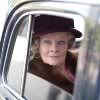 Adapted from Colin Clark's own diaries, the screenplay by TV writer Adrian Hodges (Primeval) is spotty. The beginning slogs along as he sets up the story, but it tries a little too hard to portray Colin as a fearless young man. There are many side characters that rather muddle the plot, which is progresses rather fast and furiously but really only picks up with production of The Prince and the Showgirl begins and when Marilyn Monroe arrives.
Adapted from Colin Clark's own diaries, the screenplay by TV writer Adrian Hodges (Primeval) is spotty. The beginning slogs along as he sets up the story, but it tries a little too hard to portray Colin as a fearless young man. There are many side characters that rather muddle the plot, which is progresses rather fast and furiously but really only picks up with production of The Prince and the Showgirl begins and when Marilyn Monroe arrives.
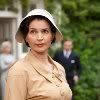 But once it does, the story takes a fascinating turn. Monroe herself is fascinating enough. But what's going on around her is equally fascinating, especially if you're into film history and filmmaking. The tension between the Monroe and Olivier is palpable. The tension between Colin and all the other men who admire and love Marilyn is palpable. The sexual tension between Colin and Marilyn is palpable. And Colin's own confusion and vulnerability are palpable. The story, at this point, is so full of conflicts and human emotions that we just can't wait to see what happens next.
But once it does, the story takes a fascinating turn. Monroe herself is fascinating enough. But what's going on around her is equally fascinating, especially if you're into film history and filmmaking. The tension between the Monroe and Olivier is palpable. The tension between Colin and all the other men who admire and love Marilyn is palpable. The sexual tension between Colin and Marilyn is palpable. And Colin's own confusion and vulnerability are palpable. The story, at this point, is so full of conflicts and human emotions that we just can't wait to see what happens next.
 Director Simon Curtis (Cranford), mostly known for his TV work, has given us a handsome production with great location shots. The film has a distinctive British feel, and it should, even though it's about some of Hollywood's most famous stars. While the beginning rushes a bit with too many peripheral bits (the plot would have been stronger if it had begun when Colin's already working as a 3rd), the core of the story as well as the relationship between Colin and Marilyn holds our interest. A large part is due to Monroe's personality and Michelle Williams's fascinating portrayal. But the director has given them a space to indulge in that piece of history.
Director Simon Curtis (Cranford), mostly known for his TV work, has given us a handsome production with great location shots. The film has a distinctive British feel, and it should, even though it's about some of Hollywood's most famous stars. While the beginning rushes a bit with too many peripheral bits (the plot would have been stronger if it had begun when Colin's already working as a 3rd), the core of the story as well as the relationship between Colin and Marilyn holds our interest. A large part is due to Monroe's personality and Michelle Williams's fascinating portrayal. But the director has given them a space to indulge in that piece of history.
 The result is quite satisfying. Williams's performance manages to eclipse the veterans' (all excellent), and the film is well made. My 99 minutes with Marilyn is well worth it.
The result is quite satisfying. Williams's performance manages to eclipse the veterans' (all excellent), and the film is well made. My 99 minutes with Marilyn is well worth it.
Stars: Michelle Williams, Eddie Redmayne, Julia Ormond, Kenneth Branagh, Emma Watson, Judi Dench, Dominic Cooper, Dougray Scott
Director: Simon Curtis
Writers: Adrian Hodges (based on book by Colin Clark)
Distributor: Weinstein Company
MPAA Rating: R for language, partial nudity, sexuality and drug use
Running Time: 99 minutes
Ratings:
Script - 7
Performance - 8
Direction - 8
Cinematography - 8
Music/Sound - 7
Editing - 7
Production - 8
Total - 7.8 out of 10.0

Anything about Marilyn Monroe is bound to be fascinating since she was such a fascinating creature. But behind her fascinating public persona, there is no secret that she was a mess. My Week with Marilyn offers a candid behind-the-scene look at one of the brightest stars in history.
 Colin Clark (Eddie Redmayne) is an ambitious young man (with British pedigree) determined to make it into the film business. Through personal network and perseverance, he begins his career working for Sir Laurence Olivier's production as a third assistant director. Lucky for him, his first movie was The Prince and the Showgirl starring Olivier (Kenneth Branagh) and Marilyn Monroe (Michelle Williams).
Colin Clark (Eddie Redmayne) is an ambitious young man (with British pedigree) determined to make it into the film business. Through personal network and perseverance, he begins his career working for Sir Laurence Olivier's production as a third assistant director. Lucky for him, his first movie was The Prince and the Showgirl starring Olivier (Kenneth Branagh) and Marilyn Monroe (Michelle Williams). Colin starts to pursue a wardrobe girl, Lucy (Emma Watson) while trying to fit in at the production where everyone treats him like a naive kid. But when Marilyn shows up, Colin's world changes. At first, everyone is in awe with her, of course. But as they realize what a mess she is -- she's always late; she's insecure; she is emotionally unstable; she acts like a frightened child -- and the production is being delayed, their patience, especially Olivier's, is wearing thin.
Colin starts to pursue a wardrobe girl, Lucy (Emma Watson) while trying to fit in at the production where everyone treats him like a naive kid. But when Marilyn shows up, Colin's world changes. At first, everyone is in awe with her, of course. But as they realize what a mess she is -- she's always late; she's insecure; she is emotionally unstable; she acts like a frightened child -- and the production is being delayed, their patience, especially Olivier's, is wearing thin. Marilyn is on the verge of a nervous breakdown, especially after her husband Arthur Miller returns to America to see his kids. Colin's apparent lack of judgment of her impresses her, and she finds confidence in him. Meanwhile, Colin falls madly in love with the movie star. For one week, Marilyn and Colin become very close. With Colin, Marilyn is able to let her guard down and show her vulnerability without feeling scared of who she really is, and not the movie star everyone expects.
Marilyn is on the verge of a nervous breakdown, especially after her husband Arthur Miller returns to America to see his kids. Colin's apparent lack of judgment of her impresses her, and she finds confidence in him. Meanwhile, Colin falls madly in love with the movie star. For one week, Marilyn and Colin become very close. With Colin, Marilyn is able to let her guard down and show her vulnerability without feeling scared of who she really is, and not the movie star everyone expects. Michelle William (Blue Valentine) is a revelation here. She's always been a good actress, having earned a few Oscar nominations in her relatively young career. But playing Marilyn Monroe, one of the most iconic personalities in the world? It's possibly one of the most challenging endeavors on Earth. And Williams has done a fantastic job capturing not only Monroe's sexuality and beauty, but also her vulnerability and insecurity and loneliness and sadness. Williams's portrayal of the star is in itself a star-making turn. I predict an Oscar nod for her again.
Michelle William (Blue Valentine) is a revelation here. She's always been a good actress, having earned a few Oscar nominations in her relatively young career. But playing Marilyn Monroe, one of the most iconic personalities in the world? It's possibly one of the most challenging endeavors on Earth. And Williams has done a fantastic job capturing not only Monroe's sexuality and beauty, but also her vulnerability and insecurity and loneliness and sadness. Williams's portrayal of the star is in itself a star-making turn. I predict an Oscar nod for her again. And that's saying a lot when Williams is surrounding by so many wonderful veteran actors playing famous actors and personalities. Julia Ormond (The Curious Case of Benjamin Button) is regal and sad as Vivien Leigh. Kenneth Branagh (Pirate Radio) is perfect as Sir Olivier Laurence. And Judi Dench (J. Edgar) is marvelously kind and stately as Dame Sybil Thorndike.
And that's saying a lot when Williams is surrounding by so many wonderful veteran actors playing famous actors and personalities. Julia Ormond (The Curious Case of Benjamin Button) is regal and sad as Vivien Leigh. Kenneth Branagh (Pirate Radio) is perfect as Sir Olivier Laurence. And Judi Dench (J. Edgar) is marvelously kind and stately as Dame Sybil Thorndike. The young actors are not that bad either. Eddie Redmayne (Black Death) first impressed us in Savage Grace, and as Colin Clark, he is ernest, lovestruck, sweet, and naive all at once. Redmayne may not be the handsomest leading man, but he has the ability to make you root for him and care. Emma Watson (Harry Potter) has a harder time breaking away from her famous role as Hermione Gringer. She is fine in her small role as Lucy, but she'd need a much better and different role if she wants us to forget her as Hermione. Dominic Cooper (Captain America) and Dougray Scott (A Thousand Kisses Deep) do well as Milton Greene and Arthur Miller respectively.
The young actors are not that bad either. Eddie Redmayne (Black Death) first impressed us in Savage Grace, and as Colin Clark, he is ernest, lovestruck, sweet, and naive all at once. Redmayne may not be the handsomest leading man, but he has the ability to make you root for him and care. Emma Watson (Harry Potter) has a harder time breaking away from her famous role as Hermione Gringer. She is fine in her small role as Lucy, but she'd need a much better and different role if she wants us to forget her as Hermione. Dominic Cooper (Captain America) and Dougray Scott (A Thousand Kisses Deep) do well as Milton Greene and Arthur Miller respectively. Adapted from Colin Clark's own diaries, the screenplay by TV writer Adrian Hodges (Primeval) is spotty. The beginning slogs along as he sets up the story, but it tries a little too hard to portray Colin as a fearless young man. There are many side characters that rather muddle the plot, which is progresses rather fast and furiously but really only picks up with production of The Prince and the Showgirl begins and when Marilyn Monroe arrives.
Adapted from Colin Clark's own diaries, the screenplay by TV writer Adrian Hodges (Primeval) is spotty. The beginning slogs along as he sets up the story, but it tries a little too hard to portray Colin as a fearless young man. There are many side characters that rather muddle the plot, which is progresses rather fast and furiously but really only picks up with production of The Prince and the Showgirl begins and when Marilyn Monroe arrives. But once it does, the story takes a fascinating turn. Monroe herself is fascinating enough. But what's going on around her is equally fascinating, especially if you're into film history and filmmaking. The tension between the Monroe and Olivier is palpable. The tension between Colin and all the other men who admire and love Marilyn is palpable. The sexual tension between Colin and Marilyn is palpable. And Colin's own confusion and vulnerability are palpable. The story, at this point, is so full of conflicts and human emotions that we just can't wait to see what happens next.
But once it does, the story takes a fascinating turn. Monroe herself is fascinating enough. But what's going on around her is equally fascinating, especially if you're into film history and filmmaking. The tension between the Monroe and Olivier is palpable. The tension between Colin and all the other men who admire and love Marilyn is palpable. The sexual tension between Colin and Marilyn is palpable. And Colin's own confusion and vulnerability are palpable. The story, at this point, is so full of conflicts and human emotions that we just can't wait to see what happens next. Director Simon Curtis (Cranford), mostly known for his TV work, has given us a handsome production with great location shots. The film has a distinctive British feel, and it should, even though it's about some of Hollywood's most famous stars. While the beginning rushes a bit with too many peripheral bits (the plot would have been stronger if it had begun when Colin's already working as a 3rd), the core of the story as well as the relationship between Colin and Marilyn holds our interest. A large part is due to Monroe's personality and Michelle Williams's fascinating portrayal. But the director has given them a space to indulge in that piece of history.
Director Simon Curtis (Cranford), mostly known for his TV work, has given us a handsome production with great location shots. The film has a distinctive British feel, and it should, even though it's about some of Hollywood's most famous stars. While the beginning rushes a bit with too many peripheral bits (the plot would have been stronger if it had begun when Colin's already working as a 3rd), the core of the story as well as the relationship between Colin and Marilyn holds our interest. A large part is due to Monroe's personality and Michelle Williams's fascinating portrayal. But the director has given them a space to indulge in that piece of history. The result is quite satisfying. Williams's performance manages to eclipse the veterans' (all excellent), and the film is well made. My 99 minutes with Marilyn is well worth it.
The result is quite satisfying. Williams's performance manages to eclipse the veterans' (all excellent), and the film is well made. My 99 minutes with Marilyn is well worth it.Stars: Michelle Williams, Eddie Redmayne, Julia Ormond, Kenneth Branagh, Emma Watson, Judi Dench, Dominic Cooper, Dougray Scott
Director: Simon Curtis
Writers: Adrian Hodges (based on book by Colin Clark)
Distributor: Weinstein Company
MPAA Rating: R for language, partial nudity, sexuality and drug use
Running Time: 99 minutes
Ratings:
Script - 7
Performance - 8
Direction - 8
Cinematography - 8
Music/Sound - 7
Editing - 7
Production - 8
Total - 7.8 out of 10.0
Hugo
© 2011 Ray Wong

If you're not familiar with Brian Selznick's Hugo, you'd have thought it's a fantasy set in 1930s Paris judging from Martin Scorsese's fantastical production. It is, in fact, a historical drama.
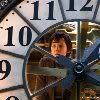 After his father (Jude Law) died in a fire, Hugo Cabret (Asa Butterfield) lives and works with his uncle (Ray Winstone) at the clock tower at the train station in Paris. He is trying to stay under the radar of the station inspector (Sacha Baron Cohen), for fear of being taken away as an orphan. The boy tries desperately to fix an automaton which could write, because he believes it would send him a message from his father. However, while trying to steal parts from a toyshop owner Papa Georges (Ben Kingsley), Hugo gets caught and his notebook is confiscated. Later, Papa Georges tells him that he's burned the book.
After his father (Jude Law) died in a fire, Hugo Cabret (Asa Butterfield) lives and works with his uncle (Ray Winstone) at the clock tower at the train station in Paris. He is trying to stay under the radar of the station inspector (Sacha Baron Cohen), for fear of being taken away as an orphan. The boy tries desperately to fix an automaton which could write, because he believes it would send him a message from his father. However, while trying to steal parts from a toyshop owner Papa Georges (Ben Kingsley), Hugo gets caught and his notebook is confiscated. Later, Papa Georges tells him that he's burned the book.
 But Georges's goddaughter Isabelle (Chloe Grace Moretz) tells Hugo that Papa Georges didn't burn the book. In fact, he's very sad for some reason. Hugo and Isabelle become fast friends. When she tries to help him find the notebook, they discovers Papa Georges is hiding a secret -- he has a box full of fantastical drawings. In solving the mystery, Hugo and Isabelle find out that the automaton is linked to Papa Georges.
But Georges's goddaughter Isabelle (Chloe Grace Moretz) tells Hugo that Papa Georges didn't burn the book. In fact, he's very sad for some reason. Hugo and Isabelle become fast friends. When she tries to help him find the notebook, they discovers Papa Georges is hiding a secret -- he has a box full of fantastical drawings. In solving the mystery, Hugo and Isabelle find out that the automaton is linked to Papa Georges.
 Asa Butterfield (Nanny McPhee Returns) has the tremendous responsibility as the titular character. He more and less have to carry the film on his shoulders (with the help of veteran actors, of course). He does a good job. While he may not be as skilled and talented as an actor like some of his contemporaries, his performance is good enough to make us care about Hugo. Chloe Grace Moretz (Let Me In) is also good, but she plays it safe here, and we miss her edgier roles.
Asa Butterfield (Nanny McPhee Returns) has the tremendous responsibility as the titular character. He more and less have to carry the film on his shoulders (with the help of veteran actors, of course). He does a good job. While he may not be as skilled and talented as an actor like some of his contemporaries, his performance is good enough to make us care about Hugo. Chloe Grace Moretz (Let Me In) is also good, but she plays it safe here, and we miss her edgier roles.
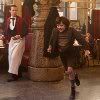 The veterans help lift the performances to a high level. Ben Kingsley (Prince of Persia: The Sands of Time) is particular great as Georges. His range is amazing and reminds us why he is one of the best actors of our time. Sacha Baron Cohen (Bruno) is all right as the station inspector, but his performance is rather a caricature. Emily Mortimer (Shutter Island), Christopher Lee (Alice in Wonderland), Ray Winstone (Lost in Italy) and Jude Law (Sherlock Holmes) all have small but affecting parts. Helen McCrory (Harry Potter and the Deathly Hallows) is extraordinarily charming and graceful as Mama Jeanne.
The veterans help lift the performances to a high level. Ben Kingsley (Prince of Persia: The Sands of Time) is particular great as Georges. His range is amazing and reminds us why he is one of the best actors of our time. Sacha Baron Cohen (Bruno) is all right as the station inspector, but his performance is rather a caricature. Emily Mortimer (Shutter Island), Christopher Lee (Alice in Wonderland), Ray Winstone (Lost in Italy) and Jude Law (Sherlock Holmes) all have small but affecting parts. Helen McCrory (Harry Potter and the Deathly Hallows) is extraordinarily charming and graceful as Mama Jeanne.
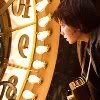 Adapted from Selznick's award-winning novel, the screenplay by John Logan (Rango) follows the original story rather faithfully. The story and plot, however, have the trappings of a children's story -- it's rather simplistic at times. The multiple subplots and threads seem irrelevant sometimes, even though the characters are endearing. The main thrust of the story is basically a mystery, but it feels more like an extended character study. There's nothing wrong with it, and we like the characters just fine.
Adapted from Selznick's award-winning novel, the screenplay by John Logan (Rango) follows the original story rather faithfully. The story and plot, however, have the trappings of a children's story -- it's rather simplistic at times. The multiple subplots and threads seem irrelevant sometimes, even though the characters are endearing. The main thrust of the story is basically a mystery, but it feels more like an extended character study. There's nothing wrong with it, and we like the characters just fine.
 However, at times the plot does seem to drag, and the pace a bit slow. The story explores certain serious themes such as loss, desperation, and generosity. But for many of its target young audience, these themes may be lost on them.
However, at times the plot does seem to drag, and the pace a bit slow. The story explores certain serious themes such as loss, desperation, and generosity. But for many of its target young audience, these themes may be lost on them.
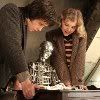 What is fantastic is the production. Director Martin Scorsese (Shutter Island) gives us a beautiful world, rendered mostly with CGI, set in a romantic time period. The art direction is amazing, and the production sometimes too gorgeous to behold. Scorsese also makes the best use of the 3D technology, and this is a film you must see in 3D. His use of camera angles, sets, perspectives, field of depth, etc. accentuates the effects of 3D. It's truly a feast for the eye.
What is fantastic is the production. Director Martin Scorsese (Shutter Island) gives us a beautiful world, rendered mostly with CGI, set in a romantic time period. The art direction is amazing, and the production sometimes too gorgeous to behold. Scorsese also makes the best use of the 3D technology, and this is a film you must see in 3D. His use of camera angles, sets, perspectives, field of depth, etc. accentuates the effects of 3D. It's truly a feast for the eye.
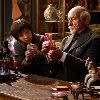 While it is technically and artistically superior, and with good performances, I can't help but feel somewhat let down by the movie. Perhaps I was expecting something a bit more fantastical or other-worldly. Instead, we get a rather simple story with a simple mystery.
While it is technically and artistically superior, and with good performances, I can't help but feel somewhat let down by the movie. Perhaps I was expecting something a bit more fantastical or other-worldly. Instead, we get a rather simple story with a simple mystery.
Stars: Ben Kingsley, Sacha Baron Cohen, Asa Butterfield, Chloe Grace Moretz, Ray Winstone, Emily Mortimer, Christopher Lee, Helen McCrory, Jude Law
Director: Martin Scorsese
Writers: John Logan (based on Brian Selznick's novel)
Distributor: Universal
MPAA Rating: PG for mild thematic material, peril and smoking
Running Time: 127 minutes
Ratings:
Script - 7
Performance - 8
Direction - 9
Cinematography - 9
Music/Sound - 8
Editing - 8
Production - 10
Total - 8.0 out of 10.0

If you're not familiar with Brian Selznick's Hugo, you'd have thought it's a fantasy set in 1930s Paris judging from Martin Scorsese's fantastical production. It is, in fact, a historical drama.
 After his father (Jude Law) died in a fire, Hugo Cabret (Asa Butterfield) lives and works with his uncle (Ray Winstone) at the clock tower at the train station in Paris. He is trying to stay under the radar of the station inspector (Sacha Baron Cohen), for fear of being taken away as an orphan. The boy tries desperately to fix an automaton which could write, because he believes it would send him a message from his father. However, while trying to steal parts from a toyshop owner Papa Georges (Ben Kingsley), Hugo gets caught and his notebook is confiscated. Later, Papa Georges tells him that he's burned the book.
After his father (Jude Law) died in a fire, Hugo Cabret (Asa Butterfield) lives and works with his uncle (Ray Winstone) at the clock tower at the train station in Paris. He is trying to stay under the radar of the station inspector (Sacha Baron Cohen), for fear of being taken away as an orphan. The boy tries desperately to fix an automaton which could write, because he believes it would send him a message from his father. However, while trying to steal parts from a toyshop owner Papa Georges (Ben Kingsley), Hugo gets caught and his notebook is confiscated. Later, Papa Georges tells him that he's burned the book. But Georges's goddaughter Isabelle (Chloe Grace Moretz) tells Hugo that Papa Georges didn't burn the book. In fact, he's very sad for some reason. Hugo and Isabelle become fast friends. When she tries to help him find the notebook, they discovers Papa Georges is hiding a secret -- he has a box full of fantastical drawings. In solving the mystery, Hugo and Isabelle find out that the automaton is linked to Papa Georges.
But Georges's goddaughter Isabelle (Chloe Grace Moretz) tells Hugo that Papa Georges didn't burn the book. In fact, he's very sad for some reason. Hugo and Isabelle become fast friends. When she tries to help him find the notebook, they discovers Papa Georges is hiding a secret -- he has a box full of fantastical drawings. In solving the mystery, Hugo and Isabelle find out that the automaton is linked to Papa Georges. Asa Butterfield (Nanny McPhee Returns) has the tremendous responsibility as the titular character. He more and less have to carry the film on his shoulders (with the help of veteran actors, of course). He does a good job. While he may not be as skilled and talented as an actor like some of his contemporaries, his performance is good enough to make us care about Hugo. Chloe Grace Moretz (Let Me In) is also good, but she plays it safe here, and we miss her edgier roles.
Asa Butterfield (Nanny McPhee Returns) has the tremendous responsibility as the titular character. He more and less have to carry the film on his shoulders (with the help of veteran actors, of course). He does a good job. While he may not be as skilled and talented as an actor like some of his contemporaries, his performance is good enough to make us care about Hugo. Chloe Grace Moretz (Let Me In) is also good, but she plays it safe here, and we miss her edgier roles. The veterans help lift the performances to a high level. Ben Kingsley (Prince of Persia: The Sands of Time) is particular great as Georges. His range is amazing and reminds us why he is one of the best actors of our time. Sacha Baron Cohen (Bruno) is all right as the station inspector, but his performance is rather a caricature. Emily Mortimer (Shutter Island), Christopher Lee (Alice in Wonderland), Ray Winstone (Lost in Italy) and Jude Law (Sherlock Holmes) all have small but affecting parts. Helen McCrory (Harry Potter and the Deathly Hallows) is extraordinarily charming and graceful as Mama Jeanne.
The veterans help lift the performances to a high level. Ben Kingsley (Prince of Persia: The Sands of Time) is particular great as Georges. His range is amazing and reminds us why he is one of the best actors of our time. Sacha Baron Cohen (Bruno) is all right as the station inspector, but his performance is rather a caricature. Emily Mortimer (Shutter Island), Christopher Lee (Alice in Wonderland), Ray Winstone (Lost in Italy) and Jude Law (Sherlock Holmes) all have small but affecting parts. Helen McCrory (Harry Potter and the Deathly Hallows) is extraordinarily charming and graceful as Mama Jeanne. Adapted from Selznick's award-winning novel, the screenplay by John Logan (Rango) follows the original story rather faithfully. The story and plot, however, have the trappings of a children's story -- it's rather simplistic at times. The multiple subplots and threads seem irrelevant sometimes, even though the characters are endearing. The main thrust of the story is basically a mystery, but it feels more like an extended character study. There's nothing wrong with it, and we like the characters just fine.
Adapted from Selznick's award-winning novel, the screenplay by John Logan (Rango) follows the original story rather faithfully. The story and plot, however, have the trappings of a children's story -- it's rather simplistic at times. The multiple subplots and threads seem irrelevant sometimes, even though the characters are endearing. The main thrust of the story is basically a mystery, but it feels more like an extended character study. There's nothing wrong with it, and we like the characters just fine. However, at times the plot does seem to drag, and the pace a bit slow. The story explores certain serious themes such as loss, desperation, and generosity. But for many of its target young audience, these themes may be lost on them.
However, at times the plot does seem to drag, and the pace a bit slow. The story explores certain serious themes such as loss, desperation, and generosity. But for many of its target young audience, these themes may be lost on them. What is fantastic is the production. Director Martin Scorsese (Shutter Island) gives us a beautiful world, rendered mostly with CGI, set in a romantic time period. The art direction is amazing, and the production sometimes too gorgeous to behold. Scorsese also makes the best use of the 3D technology, and this is a film you must see in 3D. His use of camera angles, sets, perspectives, field of depth, etc. accentuates the effects of 3D. It's truly a feast for the eye.
What is fantastic is the production. Director Martin Scorsese (Shutter Island) gives us a beautiful world, rendered mostly with CGI, set in a romantic time period. The art direction is amazing, and the production sometimes too gorgeous to behold. Scorsese also makes the best use of the 3D technology, and this is a film you must see in 3D. His use of camera angles, sets, perspectives, field of depth, etc. accentuates the effects of 3D. It's truly a feast for the eye. While it is technically and artistically superior, and with good performances, I can't help but feel somewhat let down by the movie. Perhaps I was expecting something a bit more fantastical or other-worldly. Instead, we get a rather simple story with a simple mystery.
While it is technically and artistically superior, and with good performances, I can't help but feel somewhat let down by the movie. Perhaps I was expecting something a bit more fantastical or other-worldly. Instead, we get a rather simple story with a simple mystery.Stars: Ben Kingsley, Sacha Baron Cohen, Asa Butterfield, Chloe Grace Moretz, Ray Winstone, Emily Mortimer, Christopher Lee, Helen McCrory, Jude Law
Director: Martin Scorsese
Writers: John Logan (based on Brian Selznick's novel)
Distributor: Universal
MPAA Rating: PG for mild thematic material, peril and smoking
Running Time: 127 minutes
Ratings:
Script - 7
Performance - 8
Direction - 9
Cinematography - 9
Music/Sound - 8
Editing - 8
Production - 10
Total - 8.0 out of 10.0
The Descendants
© 2011 Ray Wong

Movies about death and family can easily sink into the tearjerker territory. Writer-director Alexander Payne, who gave us his Oscar-winning Sideways, manages to tug at our heartstrings while staying just above that line.
 Matt King (George Clooney) is an attorney working and living in Hawaii, with a beautiful wife (Patricia Hastie) and two young daughters. Sounds like a perfect life. Except he is a workaholic who has long neglected his wife, who recently had a serious boating accident that put her in a coma. An absentee father, Matt has no idea how to connect with his daughters, Alexandra (Shailene Woodley) and Scottie (Amara Miller).
Matt King (George Clooney) is an attorney working and living in Hawaii, with a beautiful wife (Patricia Hastie) and two young daughters. Sounds like a perfect life. Except he is a workaholic who has long neglected his wife, who recently had a serious boating accident that put her in a coma. An absentee father, Matt has no idea how to connect with his daughters, Alexandra (Shailene Woodley) and Scottie (Amara Miller).
 On top of his family crisis, Matt is under pressure by his cousins to sell a large piece of property that could make them all very, very, very rich. Matt is the single surviving trustee and has the sole power to make the decision. It's almost a done deal, except the sale would have changed the face of Hawaii and made a lot of natives angry.
On top of his family crisis, Matt is under pressure by his cousins to sell a large piece of property that could make them all very, very, very rich. Matt is the single surviving trustee and has the sole power to make the decision. It's almost a done deal, except the sale would have changed the face of Hawaii and made a lot of natives angry.
 And as if that's not enough to drive Matt insane, he finds out that his wife was cheating on him before the accident, and she was considering a divorce. Stricken with guilt and anger and a sense of impotence, he decides to track down his wife's lover.
And as if that's not enough to drive Matt insane, he finds out that his wife was cheating on him before the accident, and she was considering a divorce. Stricken with guilt and anger and a sense of impotence, he decides to track down his wife's lover.
 George Clooney (The Ides of March) has never been better. He lets down his guard and toss away his suaveness to play a bumbling, befuddled middle-aged man who has lost touch of his own life and family. Clooney's performance is self-effacing, nuanced, and heartfelt. He makes us feel his character's anger and sorrow and everything in between without being melodramatic. In fact, his character's cool exterior can be deceiving. Clooney manages to give Matt King a full internal life despite the fact that he's a distant husband and father.
George Clooney (The Ides of March) has never been better. He lets down his guard and toss away his suaveness to play a bumbling, befuddled middle-aged man who has lost touch of his own life and family. Clooney's performance is self-effacing, nuanced, and heartfelt. He makes us feel his character's anger and sorrow and everything in between without being melodramatic. In fact, his character's cool exterior can be deceiving. Clooney manages to give Matt King a full internal life despite the fact that he's a distant husband and father.
 Shailene Woodley (Moola) gets her big screen break here as Clooney's eldest daughter, a potty-mouthed, rebellious teenager who can't connect with either of his parents. Woodley does a fine job giving the character range (from callousness to deep, conflicting emotions). But the standout is newcomer Amara Miller, who plays Scottie with such innocence and vulnerability that you just want to hug her. She's particularly heartbreaking in a scene where she learns of the truth about her mother. If you don't shed a tear watching her, you have no heart.
Shailene Woodley (Moola) gets her big screen break here as Clooney's eldest daughter, a potty-mouthed, rebellious teenager who can't connect with either of his parents. Woodley does a fine job giving the character range (from callousness to deep, conflicting emotions). But the standout is newcomer Amara Miller, who plays Scottie with such innocence and vulnerability that you just want to hug her. She's particularly heartbreaking in a scene where she learns of the truth about her mother. If you don't shed a tear watching her, you have no heart.
 The rest of the cast include Nick Krause (ExTerminators) as a surfer who is smarter than he looks. He does a great job. Patricia Hastie (Princess Kailulani) spends most of the film in a bed playing the comatose wife. Beau Bridges (Max Payne) plays it loose as Cousin Hugh. Matthew Lillard (Scooby Doo) is an interesting choice for the lover. And Judy Greer (Love and Other Drugs) is affecting as Lillard's wife.
The rest of the cast include Nick Krause (ExTerminators) as a surfer who is smarter than he looks. He does a great job. Patricia Hastie (Princess Kailulani) spends most of the film in a bed playing the comatose wife. Beau Bridges (Max Payne) plays it loose as Cousin Hugh. Matthew Lillard (Scooby Doo) is an interesting choice for the lover. And Judy Greer (Love and Other Drugs) is affecting as Lillard's wife.
 Written by Alexander Payne (Sideways), Nat Faxon (Adopted) and Jim Rash (Adopted) and based on by Kaui Hart Hemmings's novel, the screenplay is rather barebone. The story unfolds rather quickly with a lot of voice-over. It feels a bit too much exposition, but I suppose it has to be done that way to get the information out without bogging down the plot. Once the plot actually starts, though, it follows a loose structure that weaves various plot threads together. At times it feels rather contrived, with just a tad too many coincidences to suspend our disbelief. The motivations behind the characters' actions are also not always clear or convincing.
Written by Alexander Payne (Sideways), Nat Faxon (Adopted) and Jim Rash (Adopted) and based on by Kaui Hart Hemmings's novel, the screenplay is rather barebone. The story unfolds rather quickly with a lot of voice-over. It feels a bit too much exposition, but I suppose it has to be done that way to get the information out without bogging down the plot. Once the plot actually starts, though, it follows a loose structure that weaves various plot threads together. At times it feels rather contrived, with just a tad too many coincidences to suspend our disbelief. The motivations behind the characters' actions are also not always clear or convincing.
 The strength of the screenplay is the dialogue. And the strength of the film itself is the performances. And director Payne does a great job letting his actors do their thing. Clooney, in particular, shines as the leading man. Payne explores the grieving process without beating us over the head with grand emotions. Don't get me wrong, the emotions are there and at times they are overwhelming. But Payne doesn't dwell on them, or make a big spectacle out of these emotional scenes. In fact, most of the scenes are understated and achieve certain emotional poignancy that takes a lot of restraint on the director's part.
The strength of the screenplay is the dialogue. And the strength of the film itself is the performances. And director Payne does a great job letting his actors do their thing. Clooney, in particular, shines as the leading man. Payne explores the grieving process without beating us over the head with grand emotions. Don't get me wrong, the emotions are there and at times they are overwhelming. But Payne doesn't dwell on them, or make a big spectacle out of these emotional scenes. In fact, most of the scenes are understated and achieve certain emotional poignancy that takes a lot of restraint on the director's part.
 The Descendants is a flawed little film that explores many big emotions. It's about choices. It's about family. It's about betrayal and agony. It's about forgiveness and unconditional love. There are many big themes. Perhaps that's why it can be so overwhelming for a such a small film.
The Descendants is a flawed little film that explores many big emotions. It's about choices. It's about family. It's about betrayal and agony. It's about forgiveness and unconditional love. There are many big themes. Perhaps that's why it can be so overwhelming for a such a small film.
Stars: George Clooney, Shailene Woodley, Amara Miller, Nick Krause, Patricia Hastie, Beau Bridges, Matthew Lillard, Judy Greer
Director: Alexander Payne
Writer: Alexander Payne, Nat Faxon, Jim Rash (novel by Kaui Hart Hemmings)
Distributor: Fox Searchlight
MPAA Rating: R for language and sexual references
Running Time: 115 minutes
Ratings:
Script - 7
Performance - 8
Direction - 7
Cinematography - 8
Music/Sound - 8
Editing - 7
Production - 7
Total - 7.5 out of 10.0

Movies about death and family can easily sink into the tearjerker territory. Writer-director Alexander Payne, who gave us his Oscar-winning Sideways, manages to tug at our heartstrings while staying just above that line.
 Matt King (George Clooney) is an attorney working and living in Hawaii, with a beautiful wife (Patricia Hastie) and two young daughters. Sounds like a perfect life. Except he is a workaholic who has long neglected his wife, who recently had a serious boating accident that put her in a coma. An absentee father, Matt has no idea how to connect with his daughters, Alexandra (Shailene Woodley) and Scottie (Amara Miller).
Matt King (George Clooney) is an attorney working and living in Hawaii, with a beautiful wife (Patricia Hastie) and two young daughters. Sounds like a perfect life. Except he is a workaholic who has long neglected his wife, who recently had a serious boating accident that put her in a coma. An absentee father, Matt has no idea how to connect with his daughters, Alexandra (Shailene Woodley) and Scottie (Amara Miller). On top of his family crisis, Matt is under pressure by his cousins to sell a large piece of property that could make them all very, very, very rich. Matt is the single surviving trustee and has the sole power to make the decision. It's almost a done deal, except the sale would have changed the face of Hawaii and made a lot of natives angry.
On top of his family crisis, Matt is under pressure by his cousins to sell a large piece of property that could make them all very, very, very rich. Matt is the single surviving trustee and has the sole power to make the decision. It's almost a done deal, except the sale would have changed the face of Hawaii and made a lot of natives angry. And as if that's not enough to drive Matt insane, he finds out that his wife was cheating on him before the accident, and she was considering a divorce. Stricken with guilt and anger and a sense of impotence, he decides to track down his wife's lover.
And as if that's not enough to drive Matt insane, he finds out that his wife was cheating on him before the accident, and she was considering a divorce. Stricken with guilt and anger and a sense of impotence, he decides to track down his wife's lover.  George Clooney (The Ides of March) has never been better. He lets down his guard and toss away his suaveness to play a bumbling, befuddled middle-aged man who has lost touch of his own life and family. Clooney's performance is self-effacing, nuanced, and heartfelt. He makes us feel his character's anger and sorrow and everything in between without being melodramatic. In fact, his character's cool exterior can be deceiving. Clooney manages to give Matt King a full internal life despite the fact that he's a distant husband and father.
George Clooney (The Ides of March) has never been better. He lets down his guard and toss away his suaveness to play a bumbling, befuddled middle-aged man who has lost touch of his own life and family. Clooney's performance is self-effacing, nuanced, and heartfelt. He makes us feel his character's anger and sorrow and everything in between without being melodramatic. In fact, his character's cool exterior can be deceiving. Clooney manages to give Matt King a full internal life despite the fact that he's a distant husband and father. Shailene Woodley (Moola) gets her big screen break here as Clooney's eldest daughter, a potty-mouthed, rebellious teenager who can't connect with either of his parents. Woodley does a fine job giving the character range (from callousness to deep, conflicting emotions). But the standout is newcomer Amara Miller, who plays Scottie with such innocence and vulnerability that you just want to hug her. She's particularly heartbreaking in a scene where she learns of the truth about her mother. If you don't shed a tear watching her, you have no heart.
Shailene Woodley (Moola) gets her big screen break here as Clooney's eldest daughter, a potty-mouthed, rebellious teenager who can't connect with either of his parents. Woodley does a fine job giving the character range (from callousness to deep, conflicting emotions). But the standout is newcomer Amara Miller, who plays Scottie with such innocence and vulnerability that you just want to hug her. She's particularly heartbreaking in a scene where she learns of the truth about her mother. If you don't shed a tear watching her, you have no heart. The rest of the cast include Nick Krause (ExTerminators) as a surfer who is smarter than he looks. He does a great job. Patricia Hastie (Princess Kailulani) spends most of the film in a bed playing the comatose wife. Beau Bridges (Max Payne) plays it loose as Cousin Hugh. Matthew Lillard (Scooby Doo) is an interesting choice for the lover. And Judy Greer (Love and Other Drugs) is affecting as Lillard's wife.
The rest of the cast include Nick Krause (ExTerminators) as a surfer who is smarter than he looks. He does a great job. Patricia Hastie (Princess Kailulani) spends most of the film in a bed playing the comatose wife. Beau Bridges (Max Payne) plays it loose as Cousin Hugh. Matthew Lillard (Scooby Doo) is an interesting choice for the lover. And Judy Greer (Love and Other Drugs) is affecting as Lillard's wife. Written by Alexander Payne (Sideways), Nat Faxon (Adopted) and Jim Rash (Adopted) and based on by Kaui Hart Hemmings's novel, the screenplay is rather barebone. The story unfolds rather quickly with a lot of voice-over. It feels a bit too much exposition, but I suppose it has to be done that way to get the information out without bogging down the plot. Once the plot actually starts, though, it follows a loose structure that weaves various plot threads together. At times it feels rather contrived, with just a tad too many coincidences to suspend our disbelief. The motivations behind the characters' actions are also not always clear or convincing.
Written by Alexander Payne (Sideways), Nat Faxon (Adopted) and Jim Rash (Adopted) and based on by Kaui Hart Hemmings's novel, the screenplay is rather barebone. The story unfolds rather quickly with a lot of voice-over. It feels a bit too much exposition, but I suppose it has to be done that way to get the information out without bogging down the plot. Once the plot actually starts, though, it follows a loose structure that weaves various plot threads together. At times it feels rather contrived, with just a tad too many coincidences to suspend our disbelief. The motivations behind the characters' actions are also not always clear or convincing. The strength of the screenplay is the dialogue. And the strength of the film itself is the performances. And director Payne does a great job letting his actors do their thing. Clooney, in particular, shines as the leading man. Payne explores the grieving process without beating us over the head with grand emotions. Don't get me wrong, the emotions are there and at times they are overwhelming. But Payne doesn't dwell on them, or make a big spectacle out of these emotional scenes. In fact, most of the scenes are understated and achieve certain emotional poignancy that takes a lot of restraint on the director's part.
The strength of the screenplay is the dialogue. And the strength of the film itself is the performances. And director Payne does a great job letting his actors do their thing. Clooney, in particular, shines as the leading man. Payne explores the grieving process without beating us over the head with grand emotions. Don't get me wrong, the emotions are there and at times they are overwhelming. But Payne doesn't dwell on them, or make a big spectacle out of these emotional scenes. In fact, most of the scenes are understated and achieve certain emotional poignancy that takes a lot of restraint on the director's part. The Descendants is a flawed little film that explores many big emotions. It's about choices. It's about family. It's about betrayal and agony. It's about forgiveness and unconditional love. There are many big themes. Perhaps that's why it can be so overwhelming for a such a small film.
The Descendants is a flawed little film that explores many big emotions. It's about choices. It's about family. It's about betrayal and agony. It's about forgiveness and unconditional love. There are many big themes. Perhaps that's why it can be so overwhelming for a such a small film.Stars: George Clooney, Shailene Woodley, Amara Miller, Nick Krause, Patricia Hastie, Beau Bridges, Matthew Lillard, Judy Greer
Director: Alexander Payne
Writer: Alexander Payne, Nat Faxon, Jim Rash (novel by Kaui Hart Hemmings)
Distributor: Fox Searchlight
MPAA Rating: R for language and sexual references
Running Time: 115 minutes
Ratings:
Script - 7
Performance - 8
Direction - 7
Cinematography - 8
Music/Sound - 8
Editing - 7
Production - 7
Total - 7.5 out of 10.0
Subscribe to:
Posts (Atom)